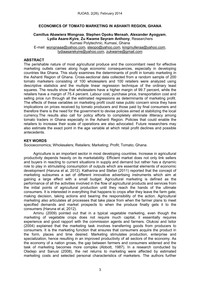ECONOMICS OF TOMATO MARKETING IN ASHANTI REGION, GHANA
Покупка
Основная коллекция
Издательство:
Редакция журнала RJOAS
Год издания: 2014
Кол-во страниц: 11
Дополнительно
Доступ онлайн
В корзину
Скопировать запись
Фрагмент текстового слоя документа размещен для индексирующих роботов.
Для полноценной работы с документом, пожалуйста, перейдите в
ридер.
RJOAS, 2(26), February 2014
ECONOMICS OF TOMATO MARKETING IN ASHANTI REGION, GHANA
Camillus Abawiera Wongnaa, Stephen Opoku Mensah, Alexander Ayogyam, Lydia Asare-Kyire, Zu Kwame Seyram Anthony, Researchers
Kumasi Polytechnic, Kumasi, Ghana
E-mail: wongnaaa@yahoo.com, steopo@yahoo.com, kingmulleraa@yahoo.com, lydiaasarekyire@yahoo.com, zukwame@gmail.com
ABSTRACT
The perishable nature of most agricultural produce and the concomitant need for effective marketing outlets carries along huge economic consequences, especially in developing countries like Ghana. This study examines the determinants of profit in tomato marketing in the Ashanti Region of Ghana. Cross-sectional data collected from a random sample of 200 tomato marketers consisting of 100 wholesalers and 100 retailers were analyzed using descriptive statistics and the multiple linear regression technique of the ordinary least squares. The results show that wholesalers have a higher margin of 99.7 percent, while the retailers have a margin of 75.4 percent. Labour cost, purchase price, transportation cost and selling price run through all the estimated regressions as determinants of marketing profit. The effects of these variables on marketing profit could raise public concern since they have implications on prices received by tomato producers and those paid by final consumers and therefore there is the need for the government to devise policies aimed at stabilizing the local currency.The results also call for policy efforts to completely eliminate illiteracy among tomato traders in Ghana especially in the Ashanti Region. Policies that could enable the retailers to increase their scale of operations are also advocated. Future researchers may also estimate the exact point in the age variable at which retail profit declines and possible antecedents.
KEY WORDS
Socioeconomics; Wholesalers; Retailers; Marketing; Profit; Tomato; Ghana.
Agriculture is an important sector in most developing countries. Increase in agricultural productivity depends heavily on its marketability. Efficient market does not only link sellers and buyers in reacting to current situations in supply and demand but rather has a dynamic role to play in stimulating consumption of outputs which are essential elements of economic development (Haruna et al, 2012). Katharina and Stefan (2011) reported that the concept of marketing subsumes a set of different innovative advertising instruments which aim at gaining a large effect with a small budget. Agricultural marketing is defined as the performance of all the activities involved in the flow of agricultural products and services from the initial points of agricultural production until they reach the hands of the ultimate consumers. It is interested in everything that happens to crops after they leave the farm gate; making decision, taking actions and bearing the responsibility of the action. Agricultural marketing also articulates all processes that take place from when the farmer plans to meet specified demands and market prospects to when the produce finally gets it to the consumers (Haruna et al, 2012).
Aminu (2009) pointed out that in a typical vegetable marketing, even though the marketing of vegetable crops does not require much capital, it essentially requires experience and good rapport with the commission agents and farmers. Olukosi and Isitor (2004) explained that the marketing task involves transferring goods from producers to consumers. It is the marketing function that ensures that consumers acquire the product in the form, places and time desired. Marketing stimulates production, enterprise and specialization, hence resulting in an improved productivity of all sectors of the economy. As the economy of a nation grows, the gap between farmers and consumers widened and the task of marketing becomes more complex (Abbott, 1987). In a research conducted by Oladejo and Sanusi (2008), the net returns to marketing were affected by estimated marketing costs and selected personal characteristics of marketers. The authors further
3
Доступ онлайн
В корзину


